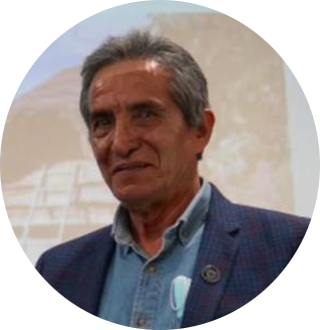
Emeritus Professor at the Autonomous University of Chapingo, affiliated with the Regional Centers Directorate, professor in the postgraduate program in Regional Rural Development, regular member of the Mexican Academy of Sciences, Member of the National System of Researchers (SNI) Level III (2022-2026) (2026-2041), State Science Award 2016, recognition for academic career by the Chapingo Foundation and the College of Agronomists of the State of Morelos.
His documented work includes over 157 scientific, academic, and outreach articles, 27 books, 73 book chapters, 90 conference presentations, and more than 30 scientific and didactic outreach videos. He has taught over 50 courses, supervised and advised over 81 theses, of which 66% are at the postgraduate level.
For his academic leadership, his colleagues have elected him, among academic peers, as Director of the University Regional Center East (1983-1986), Director of University Regional Centers (1992-1994), Coordinator of the Postgraduate Program in University Regional Centers (2005-2009), and University Councilor (2011-2013). He was also appointed as Director General of Cultural Outreach at the Autonomous University of Chapingo (1994-1998), Deputy Director of University Extension, and Academic Director General of the Institution from August 2019 to March 2021, a position from which he had to resign due to severe illness from COVID-19. In all these positions, he has distinguished himself by tirelessly promoting university academic development. Among his achievements, he has prioritized academic-institutional aspects over administrative vision; his focus on Ethnoscience in the rural world of our country, inherent in his research topics, has led to institutional actions aimed at revaluing the distinctive agricultural and cultural aspects of the rural population. This led to the creation, 28 years ago, of the National Rural Culture Fair, the implementation of cultural workshops in the university curriculum, the conservation and increase of university heritage, scientific dissemination through institutional journals, the use of video and new technologies, and the strengthening of museographic activities. At the level of University Regional Centers, he has worked to increase the university's regional presence throughout the country, with the reorganization of academic work, new educational programs, promotion of research, linkage, and dissemination of university work through various means. He has been actively involved in scientific dissemination processes, promoting the creation of newsletters, scientific and outreach journals, museum rooms, and video series, being a member of institutional editorial committees.
The research activities carried out favor a nationalist vision, allowing him to carry out unique work in our country on agricultural instruments, animal traction in Mexican agriculture, genetic resources of marginalized native species, generation of technological innovations for maize production, and the continuation of studies on traditional agricultural technology, inherited from the illustrious agronomist Efraím Hernández Xolocotzi, through Ethnoagronomy and its application to Ethnodevelopment. These contemporary original approaches are close to decolonial currents, Southern epistemology, dialogue of knowledge, and the vision of development from the perspective of buen vivir. Most of the published work is in collaboration with researchers and students, demonstrating the strategy of forming work teams and human resources, with groups of academics standing out in the following topics: Ethnoagronomy, Knowledge and Rural Development, Marginalized Mesoamerican Crops, Ethnoecology and Biocultural Heritage, Agroforestry Systems of Mexico, Research and Dissemination in Maize Production, Research in Mexican Plum, among others.


